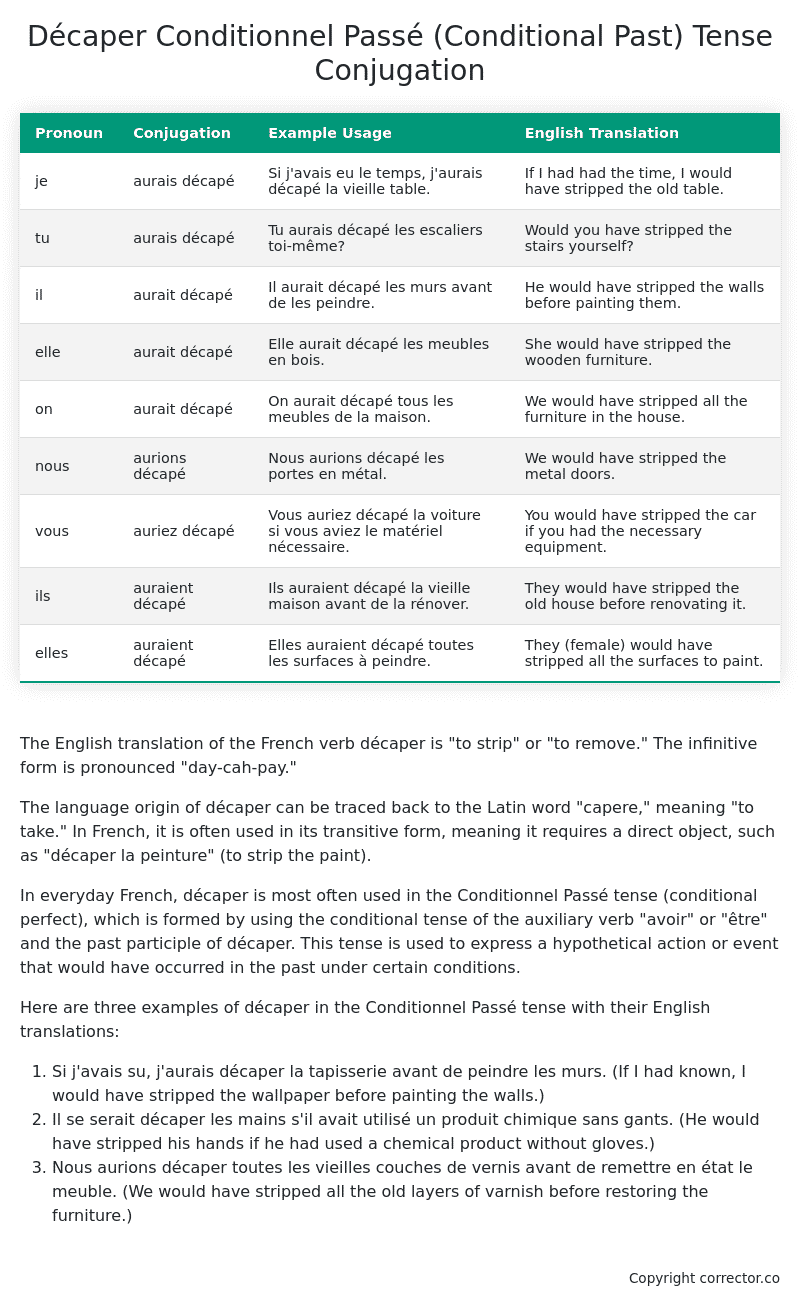Conditionnel Passé (Conditional Past) Tense Conjugation of the French Verb décaper
Introduction to the verb décaper
The English translation of the French verb décaper is “to strip” or “to remove.” The infinitive form is pronounced “day-cah-pay.”
The language origin of décaper can be traced back to the Latin word “capere,” meaning “to take.” In French, it is often used in its transitive form, meaning it requires a direct object, such as “décaper la peinture” (to strip the paint).
In everyday French, décaper is most often used in the Conditionnel Passé tense (conditional perfect), which is formed by using the conditional tense of the auxiliary verb “avoir” or “être” and the past participle of décaper. This tense is used to express a hypothetical action or event that would have occurred in the past under certain conditions.
Here are three examples of décaper in the Conditionnel Passé tense with their English translations:
- Si j’avais su, j’aurais décaper la tapisserie avant de peindre les murs. (If I had known, I would have stripped the wallpaper before painting the walls.)
- Il se serait décaper les mains s’il avait utilisé un produit chimique sans gants. (He would have stripped his hands if he had used a chemical product without gloves.)
- Nous aurions décaper toutes les vieilles couches de vernis avant de remettre en état le meuble. (We would have stripped all the old layers of varnish before restoring the furniture.)
Table of the Conditionnel Passé (Conditional Past) Tense Conjugation of décaper
| Pronoun | Conjugation | Example Usage | English Translation |
|---|---|---|---|
| je | aurais décapé | Si j’avais eu le temps, j’aurais décapé la vieille table. | If I had had the time, I would have stripped the old table. |
| tu | aurais décapé | Tu aurais décapé les escaliers toi-même? | Would you have stripped the stairs yourself? |
| il | aurait décapé | Il aurait décapé les murs avant de les peindre. | He would have stripped the walls before painting them. |
| elle | aurait décapé | Elle aurait décapé les meubles en bois. | She would have stripped the wooden furniture. |
| on | aurait décapé | On aurait décapé tous les meubles de la maison. | We would have stripped all the furniture in the house. |
| nous | aurions décapé | Nous aurions décapé les portes en métal. | We would have stripped the metal doors. |
| vous | auriez décapé | Vous auriez décapé la voiture si vous aviez le matériel nécessaire. | You would have stripped the car if you had the necessary equipment. |
| ils | auraient décapé | Ils auraient décapé la vieille maison avant de la rénover. | They would have stripped the old house before renovating it. |
| elles | auraient décapé | Elles auraient décapé toutes les surfaces à peindre. | They (female) would have stripped all the surfaces to paint. |
Other Conjugations for Décaper.
Le Present (Present Tense) Conjugation of the French Verb décaper
Imparfait (Imperfect) Tense Conjugation of the French Verb décaper
Passé Simple (Simple Past) Tense Conjugation of the French Verb décaper
Passé Composé (Present Perfect) Tense Conjugation of the French Verb décaper
Futur Simple (Simple Future) Tense Conjugation of the French Verb décaper
Futur Proche (Near Future) Tense Conjugation of the French Verb décaper
Plus-que-parfait (Pluperfect) Tense Conjugation of the French Verb décaper
Passé Antérieur (Past Anterior) Tense Conjugation of the French Verb décaper
Futur Antérieur (Future Anterior) Tense Conjugation of the French Verb décaper
Subjonctif Présent (Subjunctive Present) Tense Conjugation of the French Verb décaper
Subjonctif Passé (Subjunctive Past) Tense Conjugation of the French Verb décaper
Subjonctif Imparfait (Subjunctive Imperfect) Tense Conjugation of the French Verb décaper
Subjonctif Plus-que-parfait (Subjunctive Pluperfect) Tense Conjugation of the French Verb décaper
Conditionnel Présent (Conditional Present) Tense Conjugation of the French Verb décaper
Conditionnel Passé (Conditional Past) Tense Conjugation of the French Verb décaper (this article)
L’impératif Présent (Imperative Present) Tense Conjugation of the French Verb décaper
L’infinitif Présent (Infinitive Present) Tense Conjugation of the French Verb décaper
Struggling with French verbs or the language in general? Why not use our free French Grammar Checker – no registration required!
Get a FREE Download Study Sheet of this Conjugation 🔥
Simply right click the image below, click “save image” and get your free reference for the décaper Conditionnel Passé tense conjugation!

Décaper – About the French Conditionnel Passé (Conditional Past) Tense
Formation
Common Everyday Usage Patterns
Expressing Unreal Past Scenarios
Polite Requests or Suggestions
Expressing Doubt or Uncertainty
Interactions with Other Tenses
Conditional Present
Indicative Past Tenses
Conditional Future
Summary
Want More?
I hope you enjoyed this article on the verb décaper. Still in a learning mood? Check out another TOTALLY random French verb conjugation!


